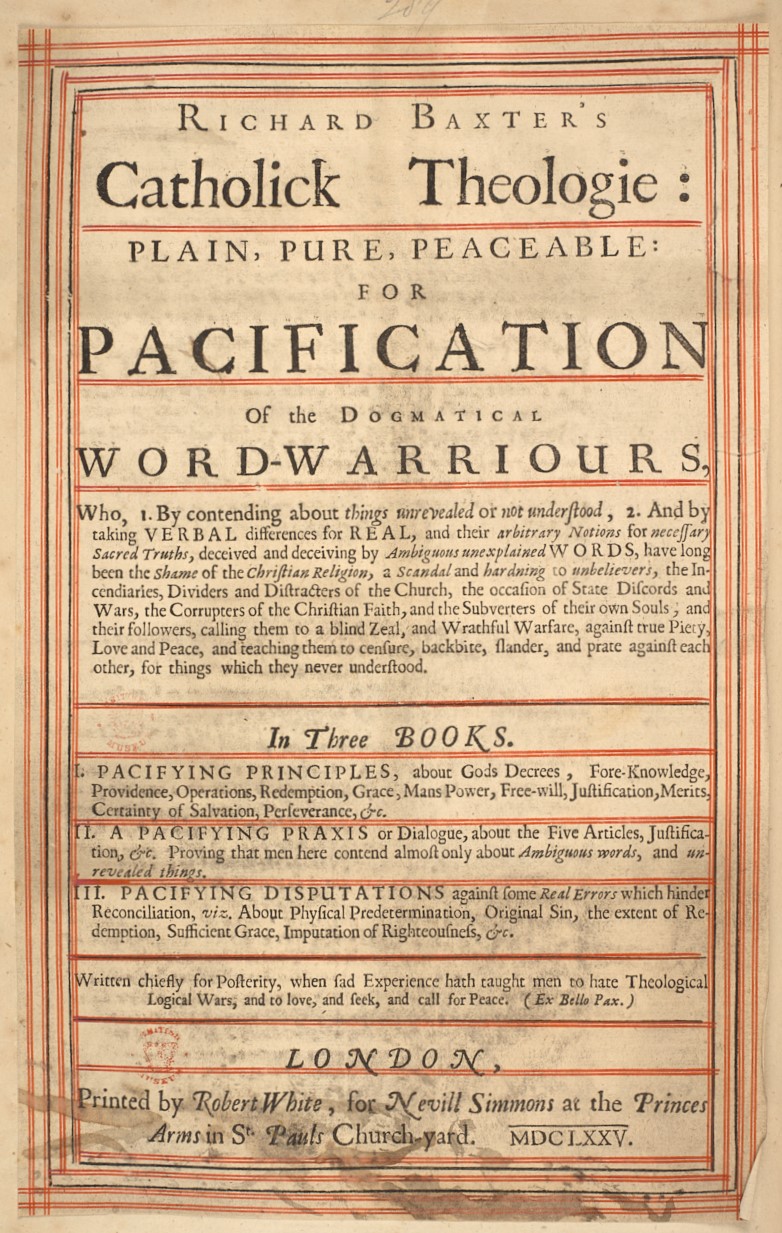Richard Baxter's Catholick theologie: plain, pure, peaceable: for pacification of the dogmatical word-warriours, who, 1. By contending about things unrevealed or not understood, 2. And by taking verbal differences for real, and their arbitrary notions for necessary sacred truths, deceived and deceiving by ambiguous unexplained words, have long been the shame of the Christian religion, a scandal and hardning to unbelievers, the incendiaries, dividers and distracters of the church, the occasion of state discords and wars, the corrupters of the Christian faith, and the subverters of their own souls, and their followers, calling them to a blind zeal, and wrathful warfare, against true piety, love and peace, and teaching them to censure, backbite, slander, and prate against each other, for things which they never understood. In three books. I. Pacifying principles, about Gods decrees, fore-knowledge, providence, operations, redemption, grace, ... II. A pacifying praxis or dialogue, about the five articles, justification, &c. ... III. Pacifying disputations against some real errors which hinder reconciliation, viz. about physical predetermination, original sin, the extent of redemption, ... Written chiefly for posterity, when sad experience hath taught men to hate theological logical wars, and to love, and seek, and call for peace. (Ex bello pax.)
Dublin Core
Title
Richard Baxter's Catholick theologie: plain, pure, peaceable: for pacification of the dogmatical word-warriours, who, 1. By contending about things unrevealed or not understood, 2. And by taking verbal differences for real, and their arbitrary notions for necessary sacred truths, deceived and deceiving by ambiguous unexplained words, have long been the shame of the Christian religion, a scandal and hardning to unbelievers, the incendiaries, dividers and distracters of the church, the occasion of state discords and wars, the corrupters of the Christian faith, and the subverters of their own souls, and their followers, calling them to a blind zeal, and wrathful warfare, against true piety, love and peace, and teaching them to censure, backbite, slander, and prate against each other, for things which they never understood. In three books. I. Pacifying principles, about Gods decrees, fore-knowledge, providence, operations, redemption, grace, ... II. A pacifying praxis or dialogue, about the five articles, justification, &c. ... III. Pacifying disputations against some real errors which hinder reconciliation, viz. about physical predetermination, original sin, the extent of redemption, ... Written chiefly for posterity, when sad experience hath taught men to hate theological logical wars, and to love, and seek, and call for peace. (Ex bello pax.)
Creator
Richard Baxter
Source
Wing (CD-Rom, 1996) B1209
Publisher
Robert White, Nevill Simons
Identifier
289
Collection
Citation
Richard Baxter, “Richard Baxter's Catholick theologie: plain, pure, peaceable: for pacification of the dogmatical word-warriours, who, 1. By contending about things unrevealed or not understood, 2. And by taking verbal differences for real, and their arbitrary notions for necessary sacred truths, deceived and deceiving by ambiguous unexplained words, have long been the shame of the Christian religion, a scandal and hardning to unbelievers, the incendiaries, dividers and distracters of the church, the occasion of state discords and wars, the corrupters of the Christian faith, and the subverters of their own souls, and their followers, calling them to a blind zeal, and wrathful warfare, against true piety, love and peace, and teaching them to censure, backbite, slander, and prate against each other, for things which they never understood. In three books. I. Pacifying principles, about Gods decrees, fore-knowledge, providence, operations, redemption, grace, ... II. A pacifying praxis or dialogue, about the five articles, justification, &c. ... III. Pacifying disputations against some real errors which hinder reconciliation, viz. about physical predetermination, original sin, the extent of redemption, ... Written chiefly for posterity, when sad experience hath taught men to hate theological logical wars, and to love, and seek, and call for peace. (Ex bello pax.),” John Bagford's Albums of Fragments, accessed November 25, 2024, https://digitalbookhistory.com/johnbagford/items/show/3068.
